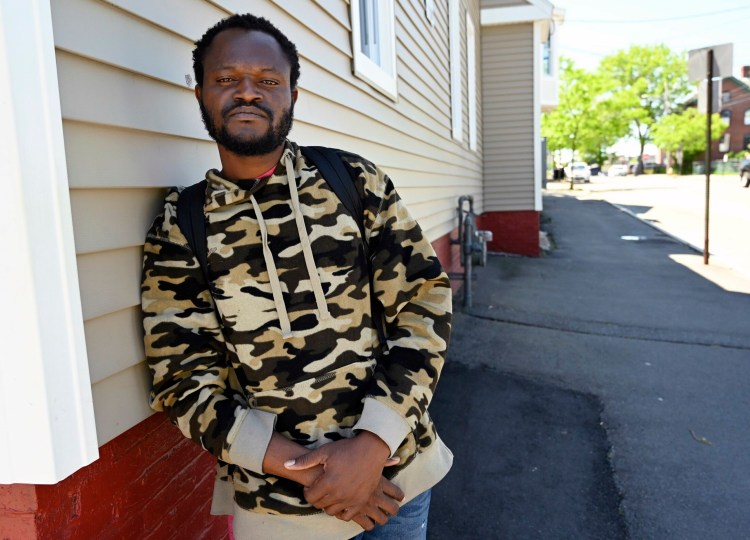Joel Nduluyele doesn’t know why a group of armed men stormed his hometown in the western region of the Congo five months ago. And he still doesn’t know what became of his pregnant wife, from whom he was separated in the chaos.
All he knew was that he had to run.
The 32-year-old asylum seeker arrived in Portland on Sunday on a bus from San Antonio, which has sent more than 100 Angolan and Congolese migrants to Maine since May. Many are fleeing violence and political instability in the Democratic Republic of the Congo, where a fragile national government has struggled with internal conflict for more than a decade.
“I suffered a lot to make it here,” Nduluyele said in an interview outside Portland’s Bayside family shelter. “A lot. A lot.”
Nduluyele and other new arrivals followed a similar route, starting in Ecuador and snaking up through Central America and Mexico.
To cross into Panama from Colombia, Nduluyele walked for 10 days through the rainforest, four of them without food. Each time he reached a border, there were visa fees and bus fares to pay. Weeks passed as he gathered money from generous strangers.
Somewhere on the same road were his brother and his family, who left, separately, around the same time. They were reunited in Portland this week, after Nduluyele arrived from San Antonio.
Still, he said, “It’s hard here. I’m not working. I don’t have money. I’m not sure what to do.”

Prince Pombo Mafumba talks on the phone as he waits at the Greyhound bus station with his wife, Thaiz Santos Neri, and daughter, Heaven Pombo Neri, after arriving in Portland on Wednesday afternoon. Derek Davis/Staff Photographer
The journey was even longer for Prince Pombo Mafumba, a Congolese migrant who stepped off a Greyhound bus in downtown Portland with his family on Wednesday afternoon.
Mafumba, a political science professor, left the Congo three years ago, after being arrested for demonstrating against then-President Joseph Kabila, who was refusing to step down after two terms, the constitutional limit.
Two and a half years passed in Brazil as Mafumba raised money for the trip north. That was long enough for him to meet his wife, Thaiz Dos Santos Neri, and bring their daughter, Heaven, into the world.
Then came months of travel through Central America, detention at the U.S. border, and then release in San Antonio. Afterward, there was only enough money to make it to Buffalo, New York, where the family has stayed for the last few months, recuperating.
“We were very, very tired,” Mafumba said. “Broken. We wanted to rest.”
Along the way, people advised the asylum seekers to head to Portland.
“I heard people talking about Portland, Maine,” said another recent arrival outside the family shelter, who identified himself only by his first name, Junior. “They said life is good there.”
Junior, who arrived on Monday with his wife and children, clarified that Portland was not the only destination on migrants’ minds. Still, the city already boasts an Angolan and Congolese community, and is known for its openness to immigrants, as well as the availability of its social services. Maine is one of the only U.S. states to allow noncitizens to receive public benefits, and Portland’s policy is never to turn away a person seeking shelter.
Once the migrants apply for asylum, they must wait months to receive their work permits.
Mafumba is weighing hospitality and tourism work, and also plans to go back to school. Nduluyele was a taxi driver in the Congo, and now hopes to make a living driving trucks. In the meantime, state and local social services will help to fill the gap.
“Our country doesn’t have the safety that yours does, or the same rights,” Nduluyele said. “And that’s why we’re asking the government of the United States for help.”
Copy the Story LinkComments are not available on this story.
Send questions/comments to the editors.


